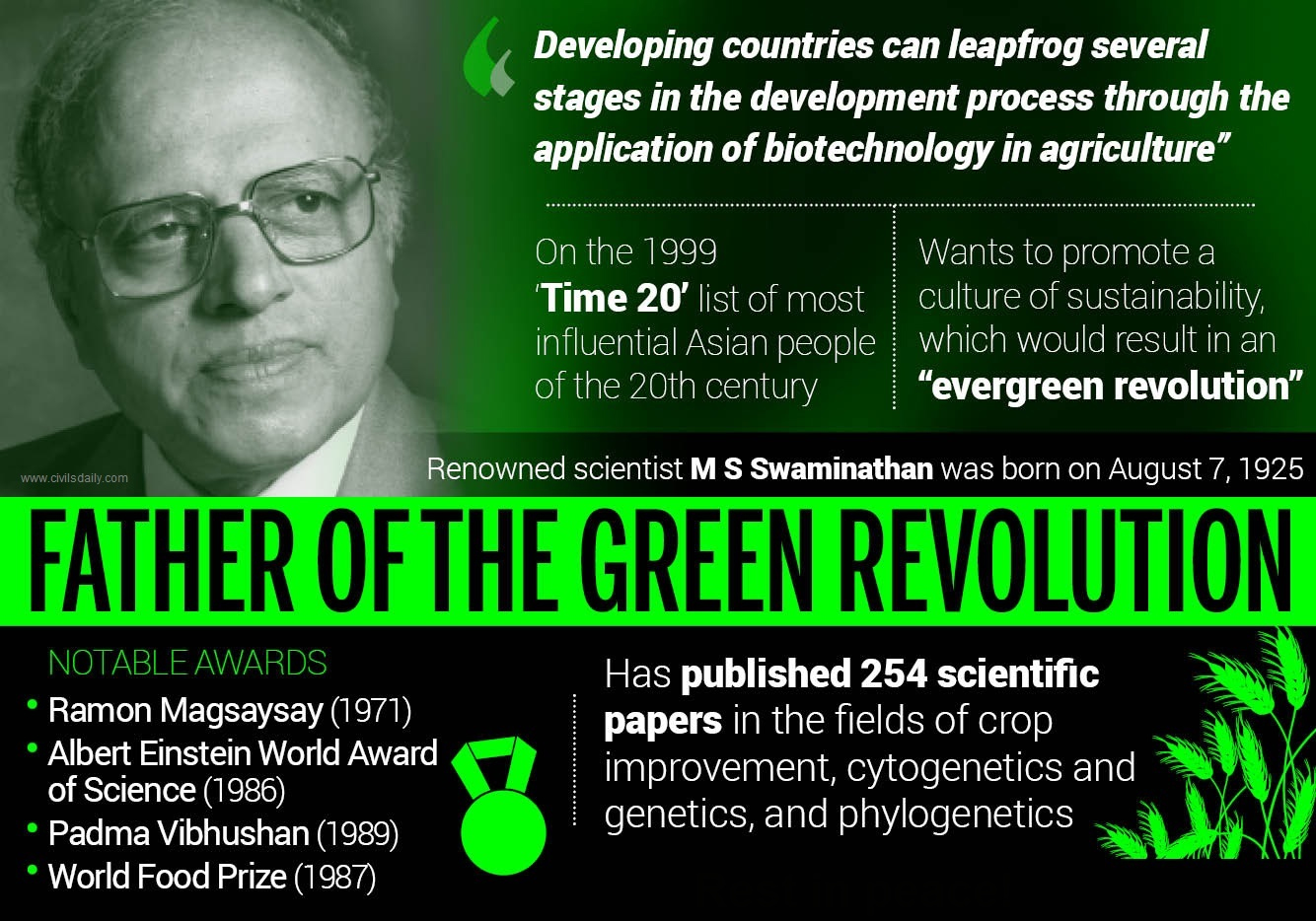Context
On 7 August, Prime Minister Narendra Modi inaugurated the M.S. Swaminathan Centenary International Conference to mark the birth centenary of Professor M.S. Swaminathan—renowned agricultural scientist and pioneer of food security. The conference brought together experts, policymakers, and stakeholders to advance the vision of an “Evergreen Revolution.” The theme for this year is “Evergreen Revolution – The Pathway to Bio-happiness.”
Highlights from the Conference:
PM Modi reaffirmed the government’s commitment to protecting the interests of farmers (kisaan), livestock rearers (pashupaalak), and fisherfolk (machhuaare). This comes amid stalled India–US trade talks over key agricultural issues.
Stakeholder-Specific Concerns:
1. Farmers
o US demand: Market access for GM soyabean and maize.
o Yield gap: Maize – India 3.5 t/ha vs US 11 t/ha; Soyabean – India 0.9 t/ha vs US 3.5 t/ha.
o Risks: Price crashes from cheaper GM imports; unfair competition as GM crops (except cotton) are banned in India; US push for ethanol exports may hurt 5 crore sugarcane farmers.
2. Livestock Rearers
o US demand: Lower tariffs on dairy imports (currently 60% on milk powder, 40% on butter, 30% on cheese).
o Risks: Threat to 8 crore small-scale dairy farmers; cultural opposition to dairy from animals fed non-vegetarian feed; US wants relaxation of India’s non-tariff barriers.
3. Fisherfolk
o US is India’s largest seafood market; shrimp is the top export.
o 2024 exports: $2.48 billion; 2025 US tariff: 50% (vs 10–20% for Vietnam, Ecuador).
o Impact: Losses for aqua farmers in Andhra Pradesh, Gujarat, Odisha, and Tamil Nadu.
About M.S. Swaminathan (1925–2023):
Professor Swaminathan was globally recognised for his contributions to agricultural science.
Key Contributions
- High-yield crop varieties:
- 1950s – Developed frost-resistant potato hybrids and crossed fragile indica rice with hardy japonica varieties, producing robust high-yield rice strains.
- 1963 – Along with Norman Borlaug, introduced dwarfing genes into wheat, producing shorter, stronger plants with higher yields.
- Father of the Green Revolution in India: Led efforts in the 1960s to boost food production through advanced breeding and modern farming techniques.
- Innovations:
- Crop cafeterias: Growing diverse crop varieties together for better nutrition.
- Crop distribution agronomy: Allowing mid-season adjustments in crop selection to optimise yields and quality.
- Policy Leadership: Chaired the National Commission on Farmers and submitted the Swaminathan Report on enhancing productivity, profitability, and sustainability in farming.
- Awards: Ramon Magsaysay Award (1971), First World Food Prize (1987), UNEP Sasakawa Environment Prize (1994), UNESCO Gandhi Gold Medal (1999).
- Honour: Awarded the Bharat Ratna posthumously in 2024.
- Positions Held: Member of Planning Commission (1980–82), Chair of UN’s Commission on Science and Technology for Development, Director General of the International Rice Research Institute (Philippines), Founder of the M.S. Swaminathan Research Foundation (MSSRF).
Evergreen Revolution:
Evergreen Revolution means increasing productivity in perpetuity without harming the environment. It was coined by M. Swaminathan. It includes:
- Promotion of organic and green agriculture through integrated pest, nutrient, and resource management.
- Village Knowledge Centres: Providing location-specific information on crops and animal husbandry.
- Biovillages: Sustainable resource management for farm and non-farm livelihoods.
- Focus on social, economic, and gender equity.
Conclusion:
Agriculture supports over half of India’s population. Unchecked trade liberalisation could lead to price crashes, rural distress, and food insecurity. India’s stance in trade negotiations aims to protect livelihoods, ensure food security, and uphold policy sovereignty while deepening fair trade ties with the US.







